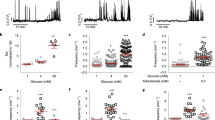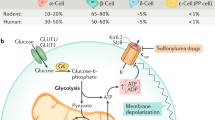Abstract
The release of insulin evoked by nutrients in the pancreatic β-cell is attributed to either the activation of a stereospecific receptor by the nutrient molecule itself or the generation of one or more signal(s) through the intracellular metabolism of the nutrient secretagogue1. The first of these hypotheses is apparently supported by the fact that nonmetabolized amino acids, especially the L-leucine analogue b(−)2-aminobicyclo[2,2, 1]heptane-2-carbocyclic acid (BCH), stimulate insulin release2. However, we now report evidence in support of the second hypothesis. We present data consistent with the idea that BCH induces insulin release through the allosteric activation of glutamate dehydrogenase. This is compatible with the fuel hypothesis, which states that the secretory response to nutrient secretagogues depends always on an increase of catabolic fluxes in the islet cells3,4.
This is a preview of subscription content, access via your institution
Access options
Subscribe to this journal
Receive 51 print issues and online access
$199.00 per year
only $3.90 per issue
Buy this article
- Purchase on Springer Link
- Instant access to full article PDF
Prices may be subject to local taxes which are calculated during checkout
Similar content being viewed by others
References
Randle, P. J., Ashcroft, S. J. H. & Gill, J. R. in Carbohydrate Metabolism and its Disorders (eds Dickens, F., Randle, P. J. & Whelan, W. J.) 427–447 (Academic, London, 1968).
Christensen, H. N. et al. Biochim. biophys. Acta 241, 341–348 (1971).
Malaisse, W. J., Sener, A., Herchuelz, A. & Hutton, J. C. Metabolism 28, 373–386 (1979).
Ashcroft, S. J. H. Diabetologia 18, 5–15 (1980).
Hutton, J. C., Sener, A. & Malaisse, W. J. Biochem. J. 184, 291–301 (1979).
Gylfe, E. Acta diabet. lat. 13, 20–24 (1976).
McGivan, J. C., Bradford, N. M., Crompton, M. & Chappell, J. B. Biochem. J. 134, 209–215 (1973).
Chapelle, S. Archs int. Physiol. Biochim. 80, 25–33 (1972).
Malaisse, W. J. et al. Molec. cell. Endocr. (in the press).
Malaisse, W. J., Brisson, G. & Malaisse-Lagae, F. J. Lab. clin. Med. 76, 895–902 (1970).
Malaisse, W. J., Hutton, J. C., Carpinelli, A. R., Herchuelz, A. & Sener, A. Diabetes 29, 431–437 (1980).
Sener, A. & Malaisse, W. J. C.r. hebd. Séanc. Acad. Sci., Paris 290, 1135–1137 (1980).
Hellerström, C., Anderson, A. & Welsh, M. Horm. Metab. Res. (in the press).
Joost, H. U., Panten, U., Ishida, H., Poser, W. & Hasselblatt, A. Life Sci. 16, 247–254 (1975).
Freinkel, N., Younsi, C. E. & Dawson, R. M. C. Proc. natn. Acad. Sci. U.S.A. 73, 3403–3407 (1976).
Author information
Authors and Affiliations
Rights and permissions
About this article
Cite this article
Sener, A., Malaisse, W. L-leucine and a nonmetabolized analogue activate pancreatic islet glutamate dehydrogenase. Nature 288, 187–189 (1980). https://doi.org/10.1038/288187a0
Received:
Accepted:
Issue Date:
DOI: https://doi.org/10.1038/288187a0
This article is cited by
-
Taurine promotes insulin synthesis by enhancing Isl-1 expression through miR-7a/RAF1/ERK1/2 pathway
In Vitro Cellular & Developmental Biology - Animal (2024)
-
Gene variations of glutamate metabolism pathway and epilepsy
Acta Epileptologica (2022)
-
Two parallel pathways connect glutamine metabolism and mTORC1 activity to regulate glutamoptosis
Nature Communications (2021)
-
Free fatty acid receptor 1: a ray of hope in the therapy of type 2 diabetes mellitus
Inflammopharmacology (2021)
-
Physiological effects of nutrients on insulin release by pancreatic beta cells
Molecular and Cellular Biochemistry (2021)
Comments
By submitting a comment you agree to abide by our Terms and Community Guidelines. If you find something abusive or that does not comply with our terms or guidelines please flag it as inappropriate.



